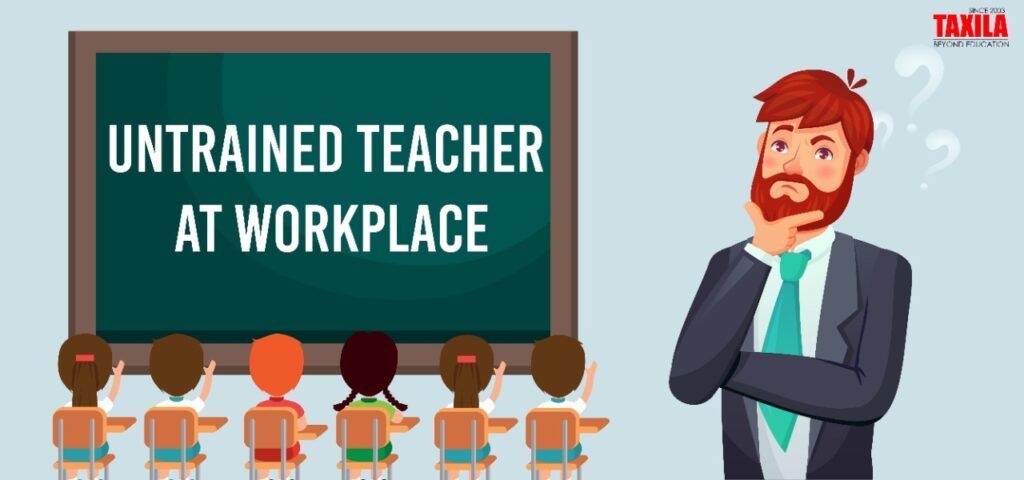
Untrained Teachers in the Workforce
An untrained teacher can sell our children short! It is true that the whole world faces a shortage of teaching staff, forcing more and more schools to recruit underqualified teachers. While it may be true that not all great teachers have gone through formal training but what is worrying is the numbers, not just in our country, but across the world. In India, teacher training is a problem faced by both the state government and the central government. In the year 2013, India had about eight lakh untrained teachers working in schools, and by 2017, the number increased to 11 lakh.
Who Is An Untrained Teacher?
Qualifications are important to make certain that the teachers educating children are well-qualified, and also to ensure the quality of education. An untrained teacher is one who has not successfully completed a standard course of teacher’s training from a recognized institute or has not been issued even a Limited Authority to Teach.
The National Council for Teacher Education (NCTE) governs the standards of teacher education in India. The minimum qualification for a teacher till V is Senior Secondary, along with a 2-year Diploma in Elementary Education. For classes from VI to VIII, graduation with a two-year Diploma in Elementary Education is required; and for the secondary level, the minimum requirement is B.Ed. or equivalent.
The central government has, however, provided relaxation in the above to the states where there is a shortage of teachers and persons with the requisite qualifications. States can also have their own legislation for teachers’ recruitment. E.g., Odisha requires only a higher secondary degree for teachers of primary classes.
Impact Of Untrained Teachers On the Education System
A qualified teacher is an instrument for effective teaching. They provide the knowledge required to integrate an individual’s problem-solving capabilities and prepare individuals for society. Ineffective teaching can completely shatter the hopes and aspirations of students, especially if they are ambitious.
Inability to expose students to hands-on experiences results in low academic performance. Hence, there is a strong need to measure teachers’ qualifications, teaching methodology, and experience. Their service gaps must be identified to fulfill the requirements of the school curriculum.
A quality teacher is able to transmit in a way that influences the behavior of the recipient. The teachers need to be invested in the objectives and skills required for effective teaching. The teachers’ professionalism and qualifications are important to the success of academic performances.
Personal, as well as professional development of the teaching staff, has a direct influence on students’ achievement. Non-qualified teachers are not prepared for managing processes and learning in schools, leading to dissatisfaction among parents and students.
.About one out of six elementary school teachers in India is not professionally trained. Constructive feedback is a way to develop their professional skills and self-efficacy. So the kind of support they get is important. What theoretical approaches to using for facilitate the students’ learning must be designed for teachers. It is more fruitful when they understand how to design lessons instead of learning outcomes by trial and error.
When, not have a researcher’s viewpoint on the importance of the theories in the program, they need to turn to others to find support. Having no teacher training can prove to be one risky experiment in a real classroom. Students may not be able to properly grasp the concepts. Training of teachers gives a better learning experience to students.
A trained teacher understands various approaches to teaching a concept. So they can use alternatives in case they have not achieved the desired result. This helps gain students’ confidence and helps them learn effectively.
A trained teacher is better at the art of expressing their ideas and concepts. Regular pieces of training strengthen their current knowledge and reinforce what actually works.
Teachers’ training courses are designed for practical classroom sessions. They are mentored and trained to make classroom teaching engaging and interesting. The importance of teacher training cannot be undermined. They are taught the nuances of teaching students and accomplishing the greatest potential of the students. It gives proper guidance and lays a strong foundation for education.
Conclusion
Taxila Business School
- Highest Placement Rs 28.60 Lakh / PA
- Average Placement Rs 11.5 Lakh / PA
- SpecializationTriple Specialization with Business Analytics compulsory.
- Ranking 10th All India.
- RatingAAA+
RTE (Right to Education) Act 2009 allowed time till 2019 for all untrained teachers in the workforce to finish their teacher training as per the bill, 2019. Many teachers remained untrained, due to which other amendments were required to be passed. Based on the Right of Children to Free and Compulsory Education Bill, passed in 2017, untrained teachers were given time to complete their teacher training. They needed to complete a Diploma in Elementary Education (D.El.Ed.) course by 2019 for service in primary/ upper primary schools.
The teacher Crisis in India is a major concern, and Special Educators are still a rarity. With the problem of unemployment, India cannot afford to drive teachers who are already teaching out of their jobs. Another reason that under-trained teachers are a part of the workforce is the acute shortage of educators in the country. Therefore, the recruitment and setup for teacher training must be taken up as a priority to avoid future crises of untrained teachers.
Read Also :

